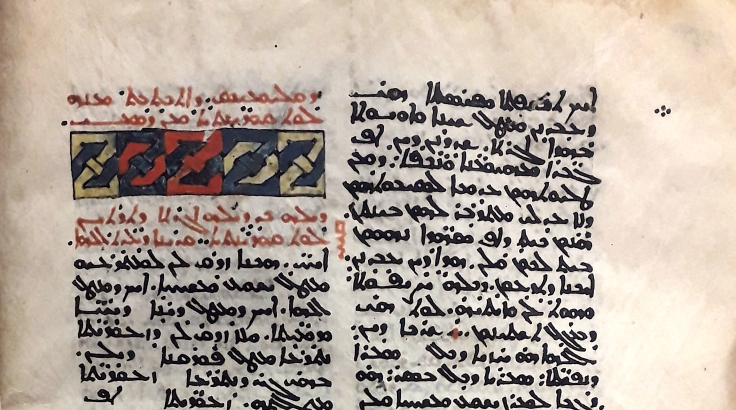I received the other day the program of the Scribal Habits in Middle Eastern Manuscripts, hosted in May 10-11 at the Institute for Advanced Studies in Princeton. I’ll be giving a paper on 1 Clement in Syriac, Coptic and Greek.

This is the ending of 1 Clement and the beginning of 2 Clement in University Library Cambridge Add. MSS 1700, folio 155b.
The description in the CfP of the workshop went as follows:
Most scholars who employ manuscripts in their research tend to focus on the literary content itself. But what about the role of the scribe who typically remains at the periphery of research? How can we, in the words of the NT textual critic James Royse, “virtually look over the scribe’s shoulder” to understand the process by which our manuscripts were produced. The aim of this workshop is to bring together scholars from various disciplines to study the individuals who produced our manuscripts and how they shaped the transmission of literary texts they copied.
The resulting program includes papers on Greek, Hebrew, Aramaic, Syriac, Coptic, Arabic, Turkish and Persian manuscripts. You can download it from here. Otherwise, have a look below:
Friday, May 10, 2019
8:30 Coffee, bagels, etc. (light breakfast)
Session 1 [Greek I] Chair: AnneMarie Luijendijk (Princeton University, Religion)
9:00 Opening
9:15 Elizabeth Buchanan, Connecting the Dots: Using Diaeresis as a Source of Information about Scribal Practices in Greek Papyri in Sixth-Century Egypt
9:45 Alan Taylor Farnes, Direct Copies as Test Cases in the Quest for Scribal Habits
10:15 Discussion
10:45 Coffee break
Session 2 [Hebrew] Chair: Dina Boero (College of New Jersey, History)
11:00 Julia G. Krivoruchko, The niqqud in medieval Judeo-Greek manuscripts: research expectations vs. scribal practice
11:30 Binyamin Katzoff, The Second-Hand Scribe: A Unique Tosefta Fragment from the Levant, Its Intellectual Environment, and Its Influence
12:00 Discussion
12:30 Lunch
Session 3 [Aramaic/Syriac] Chair: Michael Cook (Princeton University, NES)
2:00 Ed Cook, Scribal Errors and Corrections in Aramaic
2:30 Jonathan Loopstra, Scribes and Their Habits in Eighth-Century Syria
3:00 Dan Batovici, Organising 1 Clement in Syriac and Coptic: Text dividers in University Library Cambridge Add. MSS 1700, Berlin Staatsbibliothek Ms. or. fol. 3065, and Strasbourg Université copte 362-385
3:30 Discussion
4:00 Coffee break
Session 4 [Greek II] Chair: Naomi Koltun-Fromm (Haverford College)
4:30 T. C. Schmidt, Scribes and the Book of Revelation in Eastern New Testaments
5:00 Michael Dormandy, “We are the sum of our habits”: Aggregate Scribal Habits of Whole Bible Manuscripts
5:30 Discussion
6:15 Dinner
Saturday, May 11, 2019
Session 5 [Arabic] Chair: Kathleen McVey (Princeton Theological Seminary)
9:00 Ursula Bsees, Scribal Practice in Arabic Literary Papyri
9:30 Sabine Schmidtke and Hassan Ansari, Scholarly Practices in 12th-Century Kashan: Fadl Allah al-Rawandi and His Role in the Transmission of al-Sharif al-Murtada’s Ghurar al-fawa’id
10:00 Coffee break
10:15 Zuzana Gažáková, Manuscripts of Arabic Popular Epics and Sīrat Sajf ibn Dhī Yazan
10:45 Discussion
11:15 Mini-break
Session 6 [IAS Projects] Chair: Sabine Schmidtke (IAS)
11:30 Various Members Describe their projects
12:30 Lunch
Session 7 [Turkish/Persian (and Arabic)] Chair: George Kiraz (IAS)
2:00 Mihan Shiva, Manuscript production and scribal work-rate in 15th-century Iran
2:30 H. Evren Sünnetçioğlu, Inscribing Authority on the Books of Jurisprudence: Fatwās, Scribes, and Chief Jurisprudents in the Early Modern Ottoman Empire, 15th-18th Centuries
3:00 Mini-break
3:15 Discussion
3:45 Workshop Discussion & Future Conference Ideas
4:15 Enjoy Princeton!
Leave a comment